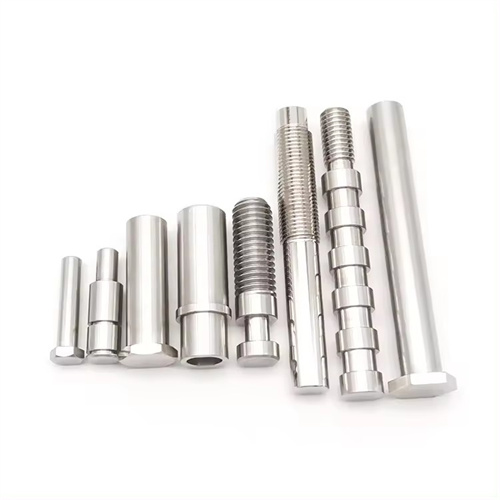
CNC Machining Shaft
CNC Machining Shaft refers to the process of manufacturing shafts using Computer Numerical Control (CNC) machining technology. Shafts are cylindrical components that transmit rotational motion and torque between mechanical parts, such as gears, pulleys, and bearings. CNC machining allows for the production of highly precise and complex shafts, making it ideal for applications that require high accuracy, durability, and performance. Shafts are mechanical components composed of one or more slender rods, mainly used in transmission mechanical systems. They can be individual rods or composite rods composed of multiple rods. Shafts play a crucial role in transmitting power and torque in mechanical equipment, typically used to connect two or more rotating components such as gears, pulleys, etc.
CNC machining is a commonly used and efficient method for producing shafts. As shafts are an indispensable component of mechanical transmission systems, they require high precision, high surface quality, and good mechanical performance. CNC machining can meet these requirements, ensuring the accuracy and reliability of shafts.

Key Features of CNC Machining Shaft:
High Precision: CNC machining can produce shafts with tight tolerances, ensuring smooth operation and minimal vibration.
Complex Geometries: CNC machines can create intricate shaft profiles, including stepped shafts, splined shafts, and hollow shafts.
Material Versatility: Shafts can be machined from a wide range of materials, including steel, aluminum, brass, and titanium.
Customization: CNC machining allows for the production of custom shafts tailored to specific applications and requirements.
Durability: CNC-machined shafts are highly durable and can withstand high loads and harsh operating conditions.

Common Types of CNC-Machined Shafts:
Stepped Shafts: Shafts with multiple diameters, used for mounting different components.
Splined Shafts: Shafts with grooves or teeth, used for transmitting torque in gear systems.
Hollow Shafts: Shafts with a central bore, used for reducing weight or routing fluids and cables.
Keyed Shafts: Shafts with keyways, used for securing components like gears and pulleys.

Applications of CNC Machining Shaft:
Electrical Appliances
In the electrical appliances industry, CNC-machined shafts are used in various devices to ensure smooth and efficient operation. These shafts must be durable, precise, and capable of handling repetitive use.
Application Examples:
Washing Machines: CNC-machined shafts are used in the drum assembly to transmit rotational motion.
Blenders and Mixers: Shafts are used in the motor assembly to transmit power to the blades or beaters.
Fans and Ventilators: CNC-machined shafts are used in the motor assembly to ensure smooth rotation of the blades.
Packaging
In the packaging industry, CNC-machined shafts are used in packaging machinery and equipment to ensure reliable and efficient operation. These shafts must withstand high loads and provide precise motion control.
Application Examples:
Conveyor Systems: CNC-machined shafts are used to drive conveyor belts and rollers.
Filling Machines: Shafts are used in the pump and valve mechanisms to control the flow of packaging materials.
Sealing Equipment: CNC-machined shafts are used in the assembly of sealing and labeling machines.
Construction
In the construction industry, CNC-machined shafts are used in heavy machinery and equipment to ensure reliable and efficient operation. These shafts must withstand high loads and harsh environmental conditions.
Application Examples:
Cranes: CNC-machined shafts are used in the winch and boom assembly to transmit rotational motion.
Excavators: Shafts are used in the hydraulic system to control the movement of the arm and bucket.
Concrete Mixers: CNC-machined shafts are used in the drum assembly to ensure smooth rotation and mixing of concrete.
Home Appliances
In the home appliances industry, CNC-machined shafts are used in various devices to ensure smooth and efficient operation. These shafts must be durable, precise, and capable of handling repetitive use.
Application Examples:
Washing Machines: CNC-machined shafts are used in the drum assembly to transmit rotational motion.
Dishwashers: Shafts are used in the pump and spray arm mechanisms to ensure efficient water circulation.
Blenders and Mixers: CNC-machined shafts are used in the motor assembly to transmit power to the blades or beaters.

CNC-machined shafts are essential components in various industries, providing precise and reliable power transmission. Their ability to meet specific design, material, and performance requirements makes them indispensable in industries such as electrical appliances, packaging, construction, and home appliances. By leveraging CNC machining, manufacturers can produce high-quality shafts that ensure the efficiency, durability, and performance of their products.